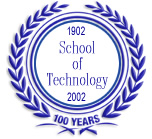
"Technology
and Us"
School of Technology
Centennial Symposium
An Extended Celebration

 |
"Technology
and Us" |
 |
|
|
Technology Doesn't Live Alone Dr.
Gene Strandberg Technology is an engine, but one that does not run alone. Its takes many forms and is dependent on other factors, primarily politics and ensuing economics. These entities are so intertwined that none can function alone, but, with other facets of the physical and social sciences, languages, and related academic areas it becomes a whole. Technology is often thought of as a separate and distinct area of study and application, but in reality it is a single part of the total scheme. Its existence is dependent upon a myriad of other interdependent functions that come together to produce a single entity. The primary impetus of technology is political decisionmaking, whether governmental, private, or individual. Politics involves consideration of the facts, mutual understanding of needs, compromise, and final action. This can range from individual decisions to group action, and is a predeterminant to moving beyond the thought stages. High knowledge technology is an involved, and continually evolving, use of bits and pieces of the sciences and their many and varied applications. High knowledge technology is founded from the human and capital investment needed to continue one step at a time to fruition. Those ideas researched and developed may not have immediate applications, if ever, but the processes involved take time, equipment, materials, human energy, and must be economically viable to continue the efforts needed to provide a product or service. It takes funding, often in massive amounts, to proceed with technological research and development. Factors not commonly thought of as integral to technology include the proliferate use of human capital, communication through a common language (often English), currencies and their continual fluctuation, production theories and practices, global labor sources and transportation, political and economic stability, the ecological ramifications of production, disposable income necessary for purchases, religious preferences and requirements, raw material availability and conversion, energy sources, and a myriad of other factors that both influence and drive technology. The cost intensive nature of high knowledge technology requires long-term capital, sometimes not to be recovered soon if ever. Individuals and nations that have access to capital, plus the individual and collective initiative to succeed, move beyond those less attuned to technological development. This soon widens the social and technological gap to an almost unreachable status for lesser individuals and nations. This is one of the sociological difficulties that face global societies: a widening disparity between the haves and have nots. Technology just doesn't live alone, rather it lives with and for the common good of nations throughout the world. The United States of America is the sole superpower of the world, both technologically and economically, and the rest of the world watches as it becomes more so and they become less so. |